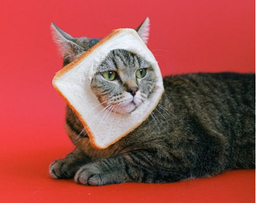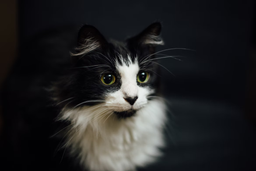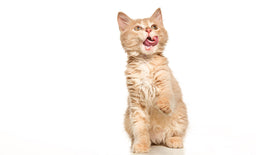Can cats eat tomatoes? Untamed points out the red flags
With their enticing colour and fresh aroma, tomatoes stand out in any bowl of salad. It’s not uncommon for kitties to get curious and lick the scarlet slices, leaving you to wonder—Can cats eat tomatoes? You go on the internet, and your heart sinks as you read frightening titles flashing, “Tomatoes are toxic for felines.” What now?
Before you go into panic mode, you should know that ripe red tomatoes aren’t poisonous to cats when ingested in small amounts. Unfortunately, tomato toxicosis in felines is still a reality. All parts of the tomato plant, including flowers and fruits, contain different concentrations of a glycoalkaloid poison known as solanine, harmful to humans and their pets.
In this guide, we will:
- Decode the safety protocols of sharing tomatoes with your kitty
- Explain the health risks or benefits associated with the fruit
- Present other dangerous human food for cats

Smiling through the pain—Identity crisis is when you’re called a fruit, treated like a veggie, and then randomly fed to hardcore meat-eaters.
Source: villanelle_official
Cats, tomatoes, and solanine poisoning explained
The toxin solanine is found in the family of nightshades, which includes plants like aubergines, tomatoes, potatoes, peppers, blueberries, and belladonnas. It has fungicidal and pesticidal properties and acts as a defence mechanism for these plants, protecting them from insects and grazers.
Solanine is found in high concentrations in the leaves, stems, flowers, seeds, and immature (green) fruits of tomato plants (about 500 milligrams per kilogram of the plant matter). Once a tomato ripens, its solanine content drops drastically to 5 milligrams per kilogram of the fruit weight, with most of the concentration being limited to the peels.
Cats can consume an occasional serving of ripe tomatoes safely—one or two slices at most, preferably peeled. Make sure to dice off the green stem at the top. Overfeeding the fruit will lead to solanine poisoning, which triggers gastrointestinal and neurological symptoms, such as:
- Stomach cramps
- Nausea
- Vomiting or regurgitation
- Diarrhoea
- Drowsiness
- Headache or dizziness
- Slowed pulse and shortness of breath
- Hypothermia
If your cat displays extreme signs of poisoning, rush them to the nearest animal clinic for timely medical attention.
While cats can handle tiny bits of ripe nightshade fruits, never give them raw ones. Green tomatoes and potatoes will most likely cause solanine poisoning in felines. If you have a tomato herb growing in your garden, make sure your kitty has no access to it, especially if they like to graze on houseplants as a pastime. By eating any part of the plant, your pet will be exposed to a heavy dose of solanine, which directly impacts the central nervous system and can be lethal.

Don’t worry, hooman, only here to shoo the crows away. Tomatoes are pretty but not meaty enough to tempt me.
Source: ladychouxbun
Can all cats stomach tomatoes?
Tomatoes are usually safe for healthy adult cats but avoid giving them to:
- Kittens—Kittens have underdeveloped digestive tracts, and even a small quantity of toxins can trigger a gastric episode, which can be life-threatening due to their low body mass
- Senior cats—Older cats tend to have increased stomach sensitivity, so they may throw up after consuming hard-to-digest snacks like fruits, vegetables, milk, and raw chicken
- Queens—Expecting cats may vomit regularly during pregnancy due to hormonal changes. Feeding them tomatoes can further destabilise their digestive health
- Allergy-prone cats—Tomatoes have histamines, which can be a potential trigger for cats with various food allergies, especially in allergy-prone breeds like Siamese cats. Other histamine-rich foods include bananas, chocolate, cheese, and nuts. You can detect an allergic reaction in your kitty early on by keeping an eye out for the following signs:
- Red, watery, and itchy eyes
- Inflamed skin and paws
- Hyperventilation
- Shedding
- Inappetence
- Vomiting and diarrhoea
- Sick cats—The immunity of sick or recuperating kitties is compromised, so exposing them to anything even mildly toxic isn’t a good idea. If your cat isn’t eating much due to diarrhoea, feed them a bland diet temporarily (instead of random human foods)
Are there any benefits to eating tomatoes?
Tomatoes, being an active source of many vitamins, minerals, and antioxidants, are considered great for humans. Cats cannot benefit from this delicious fruit. To understand, let’s check out the nutritional profile for a 100-gram serving size of the fruit:
|
Nutrition markers |
Amount |
|
Proteins |
0.9 grams |
|
Carbs |
3.9 grams |
|
Sugar |
2.6 grams |
|
Fibre |
1.2 grams |
|
Fats |
0.2 grams |
|
Energy value |
18 calories |
|
Water weight |
95% |
If you take a safe serving size of tomato (around 20 grams), its nutritional value is insignificant for felines. Still, there’s a lot of hearsay about tomatoes:
- Boosting a cat’s immune function with the fruit’s rich antioxidant content
- Helping improve hydration levels and poo consistency in constipated felines
These benefits aren’t proven, so let’s examine the truth behind them.

Sawwy I ripped it off, hooman. On the bright side, I don’t want them anymore.
Source: mirtillo_the_siberian
Do cats benefit from antioxidants in tomatoes?
Many cat parents are in favour of adding tomatoes to their kitties’ diets because the fruit is loaded with antioxidants beta carotene (a vitamin A carotenoid) and lycopene. These micronutrients provide natural sun protection and improve cardiovascular health in humans but are not super important for cats.
Felines, being obligate carnivores, have limited ability to absorb nutrients from sources other than whole meat. They are also prone to vitamin A toxicosis, which can happen from overeating carotene-rich food like tomatoes and carrots frequently. It’s a painful condition that leads to anorexia, peeling skin, and loss of mobility.
Cats do need antioxidant agents in their diet, but they should come from meat and fish, which have nutrition profiles better suited to feline biology. Make sure your kitty’s meals offer immunity-boosters like taurine, tocopherol (vitamin E), L-glutathione, and selenium that maintain heart function, improve coat health, and prevent premature cell damage. These micronutrients are available in suitable concentrations in chicken, turkey, tuna, salmon, prawns, etc.
Are tomatoes a cure for constipation in cats?
Cats with constipation have hard, dry stools and strain a lot while pooing. Feeding tomatoes and olive oil are some of the home remedies cat parents use to soften and lubricate their cats’ stools. While these foods have mild laxative properties, they are far from effective for felines. If your kitty is constipated and needs laxatives, you should reach out to a vet for prescription meds instead of relying on unsafe home remedies.
Know that the root cause of constipation in cats is a dry food diet. Felines are not active water drinkers, and consuming biscuits every day can keep them under-hydrated. Prolonged dehydration increases the risk of various conditions like constipation, hairball blockage, bladder stones, IBS, UTIs, and chronic kidney disease.
Cats need about 50 millilitres of water daily for every kilo of their body weight. The best way to restore hydration in kitties is by feeding them wet food, which has over 75% moisture content. Raw food also offers adequate moisture, but according to studies, such diets carry a high risk of contamination with pathogenic and antimicrobial-resistant bacteria.
Do cats like tomatoes?
Tomatoes have a sweet and tangy flavour due to natural sugars and citric and malic acids. Since cats don’t have the taste receptors to detect sweetness, the fruit would mostly taste sour to them. Many cat parents have reported their pets occasionally nibbling tomatoes out of sheer curiosity or boredom. It seems kitties enjoy the squishy texture and the pleasing scent of the fruit, but it’s rare for them to actively seek it as a treat. They do like to roll a whole tomato around like a ball!

Who’s the best fruit ninja around?
Source: Gansubrave
If your kitty craves tomatoes, it’s an odd eating habit, often a sign of dietary imbalance, a nutrient deficiency, or insufficient hydration.
Is your kitty’s current food balanced?
As cat parents, we want the best for our pets, but it’s often hard to determine which cat food is suitable for them. You’ll find different products with hard-to-read labels in stores, offering various protein options and nutrition supplements. While every cat food, whether wet or dry, is marketed as healthy, its true nutritional value may not be optimal.
When buying cat food, pay attention to the percentages of the following nutrients:
- Proteins—should be over 50%
- Fats—can be up to 20%
- Carbs—must remain under 3%
What proteins are suitable for cats?
Indoor cats need a higher quantity of meat proteins than other domesticated pets. If their meals offer lower than the recommended protein levels, they will lose their natural muscle tone and bone density over time. Signs of protein deficiency in cats include:
- Poor dental health and premature tooth loss
- Skin pigmentation
- Recurring illnesses or infections
- Developmental abnormalities (in kittens)
You should ensure that the protein in cat food comes from whole meat that cats can easily digest and absorb. Avoid products loaded with suboptimal protein substitutes, such as meat derivatives, vegetable proteins, gluten, and casein (milk protein). These alternative proteins have lower digestibility and absorption rates than real meat.
Are you buying products with excessive fats and carbs?
The natural feline diet in the wild is a mix of small prey like birds and rodents, which have moderate fat content and a negligible amount of carbs. If your kitty consumes too many carbohydrates, they won’t be able to burn all the calories, eventually becoming obese and developing heart diseases.
Cats should eat lean meats, like chicken and tuna, to get the right amounts of fat. Rich protein sources like eggs, lamb, beef, bacon, and pork are too greasy for them and can even trigger bouts of diarrhoea or vomiting.
As far as carbohydrates are concerned, they’re not good for cats. The feline digestive system can digest some carbs, but too much of the nutrient causes stomach sensitivity. Researchers have also found a carb-heavy diet to be the primary culprit behind feline diabetes and lower urinary tract disorders, especially in spayed or neutered cats. Steer clear from products loaded with carb-rich ingredients like:
According to vets, kitties remain healthiest on wet food that is high in protein and grain-free.

Time to kick unhealthy fillers out of your kitty’s life—Untamed wet food consists of whole meat and nothing but!
Image (c) Untamed
Feline nutrition done right—Untamed offers quality wet food!
Your kitty’s physiology requires quality animal proteins, and the best way to get them is a whole-meat diet. We prepare highly digestible gravy and jelly dishes with over 60% whole meat, fish, and organs that naturally optimise your pet’s digestive functions. Untamed products are free from all iffy ingredients like plant proteins, meat derivatives, grains, chemical additives, and sugar.
If you’re tired of deciphering deceptive cat food labels, make a switch to Untamed. We are proud of the products we create because our dishes are:
- Made with human-grade meat—Cats shouldn’t eat discarded meat unfit for human consumption. That’s why we get premium cuts with a better nutrition profile than cheap and over-processed feed-grade ingredients
- Gently cooked—We steam our food to keep the nutritional value high. The method also softens the meat and makes it easier to chew and digest
- Vet-formulated—We worked together with vets to ensure our recipes offer all necessary nutrients in correct ratios. Our dishes are packed with natural taurine and vitamin E that strengthen your kitty’s immune system over time
- Allergen-free—Our meals are free of all known allergens. If your kitty suffers from food sensitivities or allergies, our single-protein Chocka Chicken and Tuck-in Tuna meals are tailored for them!
- Mouth-watering—If you’re dealing with a picky eater who keeps ignoring wet food, introduce them to our delicacies and observe the change. Kitties cannot resist the tempting aroma and taste of Untamed!
If your cat likes variety in their diet, let them explore our meals made with chicken breast and liver, tuna, duck, salmon, mackerel, sardine, and ham. Take our TRY NOW quiz, and we’ll send you a taster pack at the best price!

Fussy who? Untamed will leave your kitty spellbound!
Image (c) Untamed
Cats on Untamed prosper in life!
Untamed formulas support the health of cats at every life stage. Our meals can also help prevent and manage several feline conditions, such as:
- Diabetes—Our high-protein food is ideal for keeping glucose levels balanced in diabetic felines, along with the necessary prescription meds. If your pet has been on Untamed since kittenhood, they will be less likely to develop this illness
- Weight imbalances—With suitable serving sizes and the right feeding schedule, Untamed can help your kitty maintain healthy weight. You can use our food to:
- Achieve desired weight in underdeveloped kittens (create a high-calorie diet with small and frequent servings)
- Support weight loss in overweight felines
- Help senior cats retain weight and appetite
- Gastrointestinal issues and FLUTDs—Our moisture-rich meals naturally prevent:
Our satisfied clients have noticed many positive changes in their cats’ health and well-being. Here’s what they’ve shared with us:
|
Timeline |
The Untamed effect! |
|
One week |
|
|
Two to four months |
|
|
Six months and beyond |
|

Let Untamed and your kitty be allies for life!
Image (c) Untamed
Speedy deliveries and free shipping—it’s always a win-win with Untamed!
If your day is packed with unending chores, you’ll love the time-efficient online cat food shopping experience we offer. You can order Untamed from the comfort of your couch and get products delivered within a day. Here’s how to order our taster pack:
- Take our TRY NOW quiz
- Select the products
- Place the order
The perks of going Untamed include:
- Free shipping
- Monthly home delivery of cat food
- Hassle-free modification and cancellation of orders
By choosing Untamed, you’re also going eco-friendly. Our food is 100% recyclable, and we get our meat and fish from suppliers who run ethical and sustainable operations.
Can cats eat tomato sauce? Or ketchup?
A lick or two of tomato sauce won’t harm cats, but nutritionists don’t recommend giving the condiment to felines. Regular ketchup is loaded with salt, sugar, oils, and preservatives. These ingredients are dangerous for cats when consumed in excess. If you want your kitty to enjoy canned sardines soaked in tomato sauce, wash off the paste before serving.
Avoid products containing xylitol, an artificial sweetener that causes rapid liver failures in cats and dogs. Many human products, especially those marked as sugar-free or low-calorie, are loaded with xylitol, and even trace amounts can harm pets. Always watch out for the xylitol content before sharing the following snacks with your kitty:
- Barbecue sauce
- Peanut butter
- Soya or lactose-free milk
- Candied apples or strawberries
- Sugar-free yoghurt or ice cream
- Caramel popcorn
- Jam
- Baked goods

I mark this snug box to be my new nap spot. Empty the junk, hooman.
Source: brucethebarbarian
Other harmful feline foods you should know about
Let’s take a look at some common human foods that can harm your feline:
- Stimulants—Cats shouldn’t have stimulants like alcohol or caffeine because they impact the central nervous system and cause tremors, respiratory failure, and even death. Tea, coffee, energy drinks, and chocolate should be off the table for your furry friend
- Allium veggies—Root and stem veggies like garlic, leeks, and onions break down a cat’s red blood cells and cause anaemia
- Grapes and raisins—Make these treats inaccessible to your kitty as they cause kidney failure, even when ingested in small quantities
- Wild mushrooms—Cats can have store-bought mushrooms, but the wild variants may have unknown toxins
- Macadamia nuts—Even small amounts of macadamia nuts are extremely harmful, often leading to hypothermia in cats
- Citrus fruits—Tangy fruits like oranges and lemons contain super-toxic essential oils limonene and linalool that can damage your cat’s liver
- Bread dough with yeast—Yeasted dough can inflate in your pet’s tummy and cause severe bloating and cramping. Yeast can also turn onto alcohol, which is highly toxic to cats
- Cooked bones—Don’t let your kitty have leftover cooked bones from soups or broths because they can splinter and cause internal injuries upon ingestion
Check out our other guides to what cats can or cannot eat:
|
|

![Best food for Ragdoll cats in the UK [Broken Down]](http://untamed.com/cdn/shop/articles/featured_best_food_for_ragdoll_cats_uk.jpg?v=1646818249&width=256)

